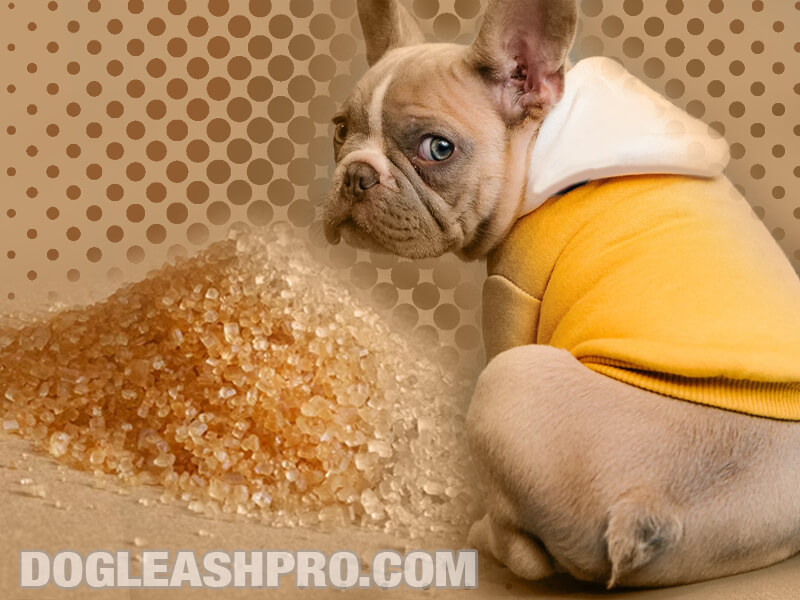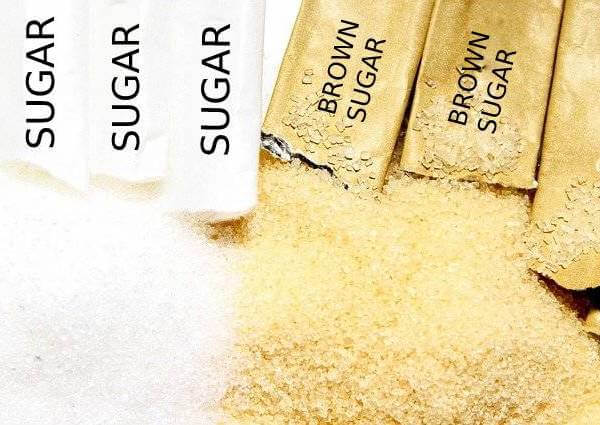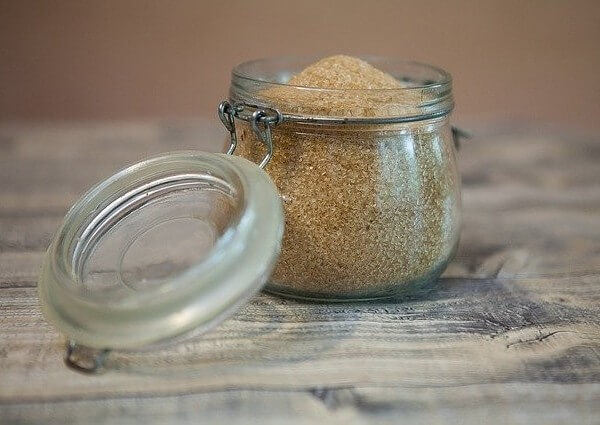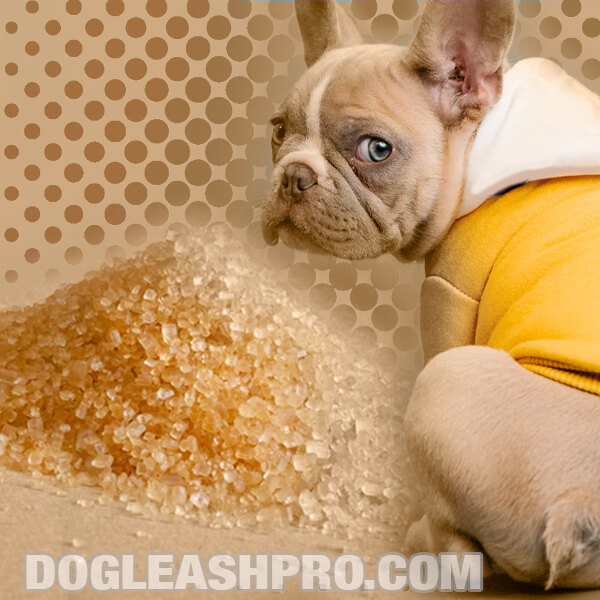
Like many, I love adding some Sugar to my oatmeal. On this particular day, I was very clumsy and sprinkled some Brown Sugar onto the kitchen table. When I turned around to grab a towel, my Labrador had already licked it off. I almost panicked and wondered, “Can my dog eat Brown Sugar?” Here’s the brief answer first.
Can dogs eat Brown Sugar? No, dogs should not eat Brown Sugar since it contains high glucose content and high levels of yeast. This combination can cause the dog’s blood sugar level to suddenly increase and lead to health issues such as vomiting, upset stomach, and even tremors in dogs. If your dogs accidentally ate Brown Sugar, they should be fine since it isn’t toxic. However, avoid feeding your dogs Brown Sugar regularly as doing so can lead to a whole host of health issues down the road.
Table of Contents
Can dogs have Brown Sugar?

No, dogs should not have Brown Sugar. To fully understand why dog owners should keep Brown Sugar away from their canine friends, let’s take a look at what Brown Sugar is and it can affect our dog’s health if consumed regularly.
Brown Sugar vs white sugar
To fully understand what Brown Sugar is, let’s compare it to white sugar.
Both Brown Sugar and white sugar are considered sucrose or sugar.
What sets Brown Sugar apart from white sugar is this:
| Brown Sugar | White Sugar |
| Brown Sugar has not been refined. | White sugar has been refined. |
| Brown Sugar is made with molasses. | |
| Usually marketed as the better, healthier, and “natural sugar.” |
While Brown Sugar sounds like the better sugar to give our four-legged friends, it’s still not a good idea. That’s because Brown Sugar is still sugar at the end of the day, whether it’s been refined or not, marketed as the healthier natural sugar, or made with molasses.
Our canine friends’ bodies do not know the difference and they absorb Brown Sugar as sugar. Therefore, Brown Sugar is bad for dogs. In this next section, we’ll discuss how Brown Sugar can negatively impact your dog’s overall health.
You may also like: Can Dogs Eat Mochi? The Sugary Truth!
Is Brown Sugar bad for dogs?

Yes, Brown Sugar is bad for dogs if consumed daily or regularly. Since Brown Sugar is simply considered sugar to our K9 friends, here’s how it affects their health and overall wellbeing.
Brown Sugar for dogs is a no-no!
Avoid feeding your furry friends Brown Sugar because sugar, in general, will cause the following in dogs.
Brown Sugar can cause upset stomach in dogs
It’s not a good idea to add Brown Sugar to your dog’s diet. When dogs eat sugary food or treat, they can get an upset stomach. Our K9 friend’s bodies contain healthy levels of helpful bacteria and other microorganisms in their guts to help them digest the food they eat.
When they ingest more sugar than usual or more sugar than what they are used to, this higher dose of Brown Sugar can disrupt the healthy balance of beneficial bacteria and other microorganisms in their guts. Dogs will then have an upset stomach and they may vomit or have bloody and explosive diarrhea.
So, does sugar give dogs diarrhea?
Yes, sugar can give dogs diarrhea so don’t be surprised if you see vomit or bloody diarrhea all over your carpet or flooring after your pooch has ingested some Brown Sugar. If you dislike having to clean up your dog’s diarrhea or vomit, it’s best to keep Brown Sugar or other types of sugar away from your four-legged friends.
Handy Hint: Dog vomit can come in a range of different colors – from yellow, green, red, and black. There are also different types of dog vomit that can tell you why your dog is vomiting and feeling sick. Check out Dog Vomit Color Guide and be sure to save this guide for future reference.
Brown Sugar can cause dental issues in dogs
Just like when we eat lots of sugar we can get cavities, dogs can also get cavities from consuming too much sugar.
When we feed our furry friends Brown Sugar, the bacteria in their mouth uses the Brown Sugar to produce acids that eat away the minerals in the enamel. When this happens, the outer coating of the dog’s teeth slowly disappears and this puts your dog at risk of dental disease.
Your pooch may start to have tooth decay, cavities, and tooth loss.
To avoid dental disease in dogs, you’ll want to avoid feeding your pooch sugary food, snacks, or treats. This means staying away from all types of sugar, including Brown Sugar.
If you notice your pooch has consumed Brown Sugar or other sugary food, it’s best to brush his or her teeth. My dog’s vet advised that I brush my dog’s teeth every day. For busy pet owners, it’s fine to brush your dog’s teeth weekly as well.
RELATED: Best Dog Toothpastes – Reviews and Comparison
It is highly recommended to have your dog’s teeth checked and professionally cleaned at least once a year by your vet. This helps to prevent dental diseases in dogs and helps them maintain their healthy pearly whites.
Brown Sugar can lead to canine obesity
Although Brown Sugar is not refined, it is still sugar. Sugary food is mainly considered “empty calorie” food and our four-legged friends should avoid this type of food at all costs. That’s because empty-calorie food and sugary food can cause your dogs to gain weight.
When dogs gain weight, it puts unnecessary stress on their joints, chest, and can even affect their gait. To make matters worse, weight gain can also affect your dog’s quality of life.
When dogs gain weight or become overweight, all that unnecessary weight is putting stress on their joints so they may start to experience joint pain. This pain can cause them to lose interest in walking, running, playing, and other physical activities. Your fur babies may also start to become lethargic and may prefer to stay in his or her doggy bed for hours.
Weight gain can also put additional stress on your dog’s chest wall and this can cause your pooch to have difficulty breathing.
Other health issues your pup may experience from weight gain include heart disease, arthritis, and respiratory issues.
The good news is that these health issues can be avoided by being careful with the type of food we feed our canine friends and keeping all types of sugar, including Brown Sugar, out of our dog’s diet.
Brown Sugar can cause affect your dog’s metabolism
When dogs consume too much Brown Sugar, it can increase their insulin secretion. When this happens, it affects your dog’s hormones and over time, they will start to lose their muscle tone and their fat storage will increase.
Additionally, their energy levels will start to decrease and their immune system may weaken.
All of this can cause your dogs to feel more tired, weak, and be less active. Your pooch may also be more prone to obesity, infections, and other hormone-related diseases.
As we can see, feeding your pooch Brown Sugar can cause changes to his metabolism and body. To prevent this from happening, it’s best to keep Brown Sugar away from your furry friends.
Brown Sugar can cause diabetes in dogs
When your dog’s metabolism changes and he keeps gaining weight, there’s a high chance that he will develop diabetes, specifically Type II diabetes. Dogs with Type II diabetes are not able to properly process sugar because their pancreases have been negatively affected.
The dog’s pancreas is responsible for producing insulin, which is a hormone that helps to control the amount of sugar (or glucose) in the dog’s blood. When the pancreas is negatively impacted, it starts to produce very little insulin or simply does not produce any insulin at all.
As a result, there’s a high buildup of sugar or glucose in the dog’s blood which means the dog has diabetes.
You may be interested in: Can Dogs Eat White Chocolate?
Regularly consuming Brown Sugar may lead to pancreatitis
When dogs consume lots of sugar, such as Brown Sugar, it can cause pancreatitis. That’s when the pancreas becomes inflamed and it can be quite painful. You may notice your dog crouching over or bent over in almost a praying position.
Their front legs and head are lowered onto the ground while their rear-end is sticking up in the air.
Signs and symptoms of pancreatitis include:
- Vomiting.
- Nausea.
- Diarrhea.
- Abdominal pain.
- Fever.
- Lethargy.
- Loss of appetite.
My dog ate a bunch of Brown Sugar! What should I do?
If your dog ate a bunch of Brown Sugar and is experiencing any of the above symptoms, you’ll want to contact your vet right away. Your vet may ask you to bring your dog in so that they can perform a thorough check-up of your pooch as well as other types of necessary tests including laboratory tests, pancreatic tests, and ultrasounds.
The sooner your dog is treated, the better the prognosis so make sure to get in touch with your vet right away if you notice any of the above symptoms.
Is Brown Sugar safe for dogs?
As we can see, Brown Sugar is not safe for dogs, and pet owners should avoid feeding their pooch Brown Sugar. It’s best to keep Brown Sugar or other types of sugar away from your canine friends since it doesn’t provide any health benefits to our dogs and can negatively affect their overall health and well-being.
Other names sugar goes by that are unsafe and unhealthy for dogs
There are many human food and snacks that contain either white refined sugar or Brown Sugar. Since both of them are unhealthy for dogs, it’s best to keep them out of your dog’s diet.
Sugar can be very tricky to pinpoint when you’re looking at the list of ingredients because they go by various other names. Watch out for the following ingredients and keep them away from your pooch:
- Corn syrup.
- Molasses.
- Honey.
- Fructose.
- Sucrose.
- Sorbitol.
- Caramel.
- Beet pulp.
Fun Fact: Juice concentrate is another name for sugar. Many powdered juice concentrate contains added sugar which is harmful to dogs. Check out Can Dogs Drink Apple Juice? to find out if Apple Juice is safe for canine consumption.
Brown Sugar and dogs
Can dogs eat oatmeal with Brown Sugar?
No, dogs should not eat oatmeal with Brown Sugar. While oatmeal by itself is fine for doggy consumption, Brown Sugar is not. So if you plan on feeding your pooch some oatmeal, that is fine, just avoid adding in the Brown Sugar or choose plain non-sugar oatmeal.
Oatmeal by itself is packed full of antioxidants, minerals, and nutrients. If you plan on feeding your pooch some oatmeal, be sure to feed them oatmeal in moderation without the Brown Sugar.
Check out: Can Dogs Eat Cereal?
Can dogs eat Brown Sugar cinnamon pop tarts?
No, dogs should not eat Brown Sugar cinnamon pop tarts. Pop tart is a human snack that is awfully sweet and is considered an “empty calorie” food. No matter what flavor the pop tart is, it is not healthy or safe for dogs in any shape, way, or form.
The same can be said when it comes to Brown Sugar cinnamon pop tarts. They are unhealthy for dogs and regularly eating this could lead to health issues such as diabetes, weight gain, dental disease, arthritis, metabolic changes, and even pancreatitis.
Check out: For more information on Pop Tarts and how this snack can affect your dogs’ health, you’ll want to check out Can Dogs Eat Pop Tarts? We’ll go over several reasons why your dogs should avoid this sweet human snack and you don’t want to miss it!
Can dogs eat Brown Sugar oatmeal?
No, dogs should not eat Brown Sugar oatmeal. Similar to how dogs should not eat oatmeal with Brown Sugar, dogs should also avoid Brown Sugar oatmeal.
Our dogs’ bodies naturally produce sugar when they consume complex carbohydrates from their regular healthy and well-balanced diet. They don’t need us to feed them sugar or food dosed in sugar.
Can dogs eat maple Brown Sugar oatmeal?
No, dogs should not eat maple Brown Sugar oatmeal. While oatmeal itself is relatively healthy for dogs in moderation, flavored oatmeal such as maple Brown Sugar oatmeal is not healthy for canine consumption and is loaded full of sugar.
As we discussed above, regular sugar consumption can lead to a host of health issues in dogs.
It’s important to point out that while oatmeal contains tons of vitamins, minerals, and other nutrients that are beneficial to our dog’s health, be careful not to overfeed them oatmeal. That’s because oatmeal does contain tons of natural fats which can be harmful to dogs.
Can dogs eat sweet potatoes with Brown Sugar?
No, dogs should not eat sweet potatoes with Brown Sugar. Sweet potatoes by themselves are nutritious to dogs. They are packed full of vitamins and minerals such as calcium, iron, potassium, and vitamins A, B6, and C. They’re also an excellent source of fiber for dogs.
However, when the sweet potatoes are mixed with Brown Sugar, they are no longer safe for doggy consumption.
Usually, sweet potatoes with Brown Sugar are when you make Brown Sugar roasted sweet potatoes or classic candied sweet potatoes and both are terrible and unhealthy for dogs.
Find out: Can Dogs Eat Mashed Potatoes?
DISCLAIMER: THIS WEBSITE DOES NOT PROVIDE MEDICAL ADVICE
The information, including but not limited to, text, graphics, images and other material contained on this website are for informational purposes only. No material on this site is intended to be a substitute for professional veterinary advice, diagnosis, or treatment. Always seek the advice of your veterinarian or other qualified health care provider with any questions you may have regarding dietary needs.
Resources:
https://en.wikipedia.org/wiki/Brown_sugar
https://blogs.library.duke.edu/rubenstein/2016/02/25/amari-stokes/

With over five years of specialized experience as an animal writer, my expertise lies in dog nutrition, health, behavior, grooming, and training. I am dedicated to delivering helpful and informative content that caters to the well-being of our furry friends. My primary goal is to empower pet owners with knowledge and ensure our canine companions thrive in health and happiness. In my free time, I love volunteering at local dog rescue centers.







